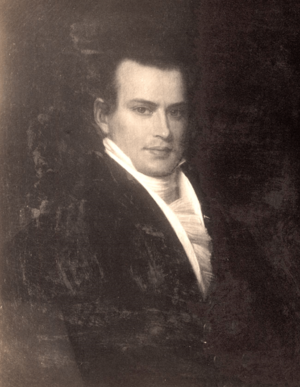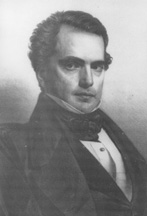William Cabell Rives facts for kids
Quick facts for kids
William Cabell Rives
|
|
|---|---|
 |
|
| Member of the Confederate Congress from Virginia's 7th district | |
| In office May 2, 1864 – March 2, 1865 |
|
| Preceded by | James Philemon Holcombe |
| Succeeded by | Position abolished |
| Delegate from Virginia to the Provisional Confederate Congress | |
| In office February 4, 1861 – February 17, 1862 |
|
| Preceded by | Position established |
| Succeeded by | Position abolished |
| United States Minister to France | |
| In office 1849–1853 |
|
| Appointed by | Zachary Taylor |
| Preceded by | Richard Rush |
| Succeeded by | John Y. Mason |
| In office 1829–1833 |
|
| Appointed by | Andrew Jackson |
| Preceded by | James Brown |
| Succeeded by | Levett Harris |
| United States Senator from Virginia |
|
| In office January 18, 1841 – March 3, 1845 |
|
| Preceded by | Himself |
| Succeeded by | Isaac S. Pennybacker |
| In office March 4, 1836 – March 3, 1839 |
|
| Preceded by | John Tyler, Jr. |
| Succeeded by | Himself |
| In office December 10, 1832 – February 22, 1834 |
|
| Preceded by | Littleton W. Tazewell |
| Succeeded by | Benjamin W. Leigh |
| Member of the U.S. House of Representatives from Virginia's 10th district |
|
| In office March 4, 1823 – 1829 |
|
| Preceded by | Thomas L. Moore |
| Succeeded by | William F. Gordon |
| Member of the Virginia House of Delegates from Albemarle County | |
| In office 1822-23 |
|
| Preceded by | Charles Cocke |
| Succeeded by | Thomas Mann Randolph |
| Member of the Virginia House of Delegates from Nelson County | |
| In office 1817–1820 |
|
| Preceded by | Joseph Shelton |
| Succeeded by | John P. Cobbs |
| Personal details | |
| Born | alongside William F. Gordon May 4, 1793 Amherst County, Virginia |
| Died | April 25, 1868 (aged 74) Charlottesville, Virginia |
| Resting place | alongside William F. Gordon alongside Thomas McCleland, John P. Cobbs and Joseph Shelton |
| Nationality | American |
| Political party | Democratic, Whig |
| Parent |
|
William Cabell Rives (born May 4, 1793, died April 25, 1868) was an important American politician and diplomat from Virginia. He started his career as a lawyer and a planter, owning large farms. Rives served in the Virginia House of Delegates and then in the U.S. House and Senate. He also worked as the U.S. Minister (like an ambassador) to France twice. During the American Civil War, he became a delegate to the Provisional Confederate Congress and the Confederate House of Representatives.
Contents
Early Life and Education
William Cabell Rives was born at "Union Hill," his grandfather's large farm estate in what is now Nelson County, Virginia. His parents were Robert Rives and Margaret Cabell. His father, Robert Rives, was a successful merchant who owned a plantation called Oak Hill. William was one of three sons who became lawmakers.
William received private lessons at home. He then attended Hampden-Sydney College and the College of William and Mary. He later studied law with Thomas Jefferson at Monticello, which was close to his home.
During the War of 1812, Rives joined his local militia. This group helped defend Virginia during the war.
Family Life
In 1819, William Cabell Rives married Judith Page Walker. She also came from a well-known Virginia family. They had several children.
Their oldest son, Francis Robert Rives, became a lawyer and diplomat like his father. He later moved to New York. His son, George Lockhart Rives, also became a lawyer and diplomat.
Another son, William C. Rives Jr., also studied law and managed farms in Virginia. His son, William Cabell Rives (the third), helped build the Washington National Cathedral.
Their youngest son, Alfred Landon Rives, became a famous engineer. He worked on the U.S. Capitol building. His granddaughter, Amélie Rives, became a well-known novelist.
His First Jobs
In 1814, Rives became a lawyer in Richmond. He started his law practice in Nelson County. After he married, he moved to his wife's family estate, Castle Hill, in Albemarle County. This beautiful home remained his main residence for the rest of his life.
Like many wealthy landowners in his time, Rives operated his large farms using the labor of enslaved people. Records show that he owned many enslaved people throughout his life. His family members also owned enslaved people.
A Career in Politics
Rives began his political journey in 1816. He was a delegate for Nelson County at a state meeting to discuss the constitution. He then won elections to serve in the Virginia House of Delegates from 1817 to 1819. Later, he represented Albemarle County in 1822.
In 1822, voters in Virginia elected him to the United States House of Representatives. He served there from 1823 to 1829.
In 1829, President Andrew Jackson chose Rives to be the U.S. Minister to France. This was a very important job, like being an ambassador today.
When Rives arrived in France, relations between the U.S. and France were difficult. This was because France owed the U.S. money for American ships and sailors captured during the Napoleonic Wars. The French Navy had taken American ships and held their crews captive. Many people thought it was impossible to fix the problem. However, Rives successfully convinced the French government to sign a treaty on July 4, 1831. This agreement meant France would pay the U.S. 25 million French francs (about $5 million) in damages. The payments were delayed for a while, but they were finally made in 1836.
After returning from France, Rives was elected to the United States Senate by Virginia lawmakers. He served multiple terms as a Senator. At one point, he resigned because he disagreed with a decision to criticize President Jackson. However, he was later re-elected to the Senate. During his third term, Rives joined the Whig Party.
Rives also served on the Board of Visitors for the University of Virginia for many years. He was also the president of the Virginia Historical Society. In 1849, he was again appointed as the U.S. Minister to France, serving until 1853.
Later Years and the Civil War
William Cabell Rives wrote several books and pamphlets. These included Life and Character of John Hampden (1845) and Life and Times of James Madison (1859–68). His wife, Judith, also published several books.
In 1860, Rives supported a new political group called the Constitutional Union Party. He received many votes for president from Virginia at their meeting.
As tensions grew before the American Civil War, Rives attended a Peace Conference in Washington. This meeting tried to prevent the war. Even though Rives spoke against Virginia leaving the United States, he remained loyal to his home state when it did secede. He then served in the Provisional Confederate Congress from 1861 to 1862. He also served in the Second Confederate Congress from 1864 to 1865.
His Legacy
William Cabell Rives passed away at his home, Castle Hill, in 1868. He was buried in the family cemetery there. The town of Rivesville, West Virginia is named after him.
See also
- McCoy, Drew R. The Last of the Fathers: James Madison and the Republican Legacy. Cambridge, MA: Cambridge University Press, 1989, pp. 323–369.
 | DeHart Hubbard |
 | Wilma Rudolph |
 | Jesse Owens |
 | Jackie Joyner-Kersee |
 | Major Taylor |


